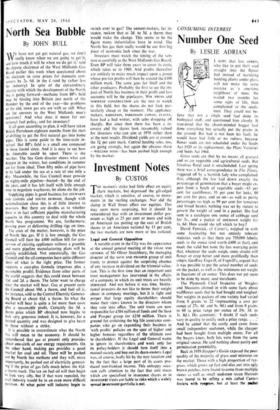CONSUMING INTEREST
Number One Seed
By LESLIE ADRIAN
I HOPE that late sowers, who like to put their seed straight into the flower bed instead of nurturing bedding plants under glass, will not make the same mistake as a one-time neighbour of mine. He waited two months for some signs of life, then complained to the seeds- men. They could not be- lieve that not a single seed had done its biological stuff, and questioned him closely. It transpired that the absent-minded beggar had done everything but actually put the grains in the ground. But had it not been his fault, he would have had little or no redress, because flower seeds are not scheduled under the Seeds Act: 1920 or its replacement, the Plant Varieties and Seeds Act 1964.
Grass seeds are (but by no means all grasses) and so are vegetable and agricultural seeds. But frivolous floral seed is unscheduled. Last spring there was a brief correspondence in The Times, triggered off by a Scottish lady who complained that, although the law laid down exactly the percentage of germination that a buyer might ex- pect from a batch of vegetable seeds-65 per cent for cauliflower, 55 per cent for leeks, 80 per cent for peas, and so on—as well as purity percentages (as high as 99 per cent for tomatoes and broad beans), nothing was set by statute to govern the weight of seed in a packet. She had seen in a catalogue one ounce of cabbage seed for 3s., and a packet of unknown weight for Is. 6d. How could she tell which to buy?
David Fenwick, of Carter's, weighed in with some fascinating but not entirely relevant statistics, such as that there are 750,000 lobelia seeds to the ounce (and worth £400 at that), and made the valid but none the less worrying point that, whatever the seeds weigh, some strains will flower or crop better and more prolifically than othys. Geoffrey Fogwill, of Fogwill's, argued that it was possible to put the actual number of seeds on the packet, as well as the minimum net weight in fractions of an ounce. This does not yet seem to be done by many seed merchants.
The Plymouth Chief Inspector of Weights and Measures chimed in with some facts about wallflower seeds that he had bought and weighed. Net weights in packets of one variety had varied from 8 grains to 22 (representing a cost per ounce of 27s. 4d. and 9s. 9d.) and from 9 grains to 60 (a price range per ounce of 24s. 3d. to 3s. 8d.). His comment: 'I doubt if such seeds vary in quality to justify such a price range. . . And he added that the costly seed came from small independent seedsmen, while the cheaper had been bought from multiple stores. For all the buyers knew, both lots were from the same original source. He said nothing about purity and germination potentiality.
Back in 1959 Shopper's Guide exposed the poor quality of the majority of grass seed mixtures on the market. Those with a high proportion of rye- grass, which grows up fast and dies out into ugly brown patches, were found to come from multiple stores as well as small seedsmen (even Harrods was found to be selling a mix called Carters }mien" with repass, but at least the packet
said so). Herbage seeds are scheduled, but lawn seeds are not yet, so the 1959 situation prob- ably remains unchanged. While the difficulties of setting standards for flower seeds are obvi- ously numerous, there seems to be no reason why packets should not at least bear a date (few seeds will store well, except perhaps the new `harvest fresh' air-dried Suttons), a quantity, and an approximate weight by means of some such wording as 'Guaranteed not less than . . .' and a fraction of an ounce or a gram measure. It seems strange that a nation of gardeners Awaid tolerate the present unsatisfactory state- of the seed business. The climate surely imposes enough risks.
There is one crumb of comfort in the realisa- tion that the big seed merchants are jealous of their reputations. If a batch of seed fails to perform according to expectations (and I don't mean that the flowers fail to match the picture on the packet or in the catalogue—unless a quite different variety appears), tell your seedsman. Most times he will be sympathetic and helpful.
Browsing through a heap of beautifully printed seed catalogues I came across vegetable spag- hetti : `A delicious vegetable. They produce delicious spaghetti-like pulp. . . That*- old BBC-TV April Fool programme could have been dead serious. If you want to plant some spaghetti, it comes from Thompson and Morgan, Ipswich, and costs Is. 6d. a packet.



































 Previous page
Previous page